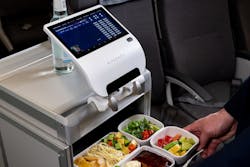Can the tracking of in-flight catering improve airline sustainability?
TOULOUSE, France - Airbus’ highly innovative digital solution to this challenge includes the automatic capture of data for passengers' onboard meal consumption, along with tracing the amount of unused food and drinks that remain. By integrating such information in an artificial intelligence-driven system, airlines could optimise their catering services and better manage the after-meal disposal – leading to a potential for double-digit reductions in their CO2 emissions through weight reductions and fuel savings, Airbus writes. Continue reading original article.
The Military & Aerospace Electronics take:
30 June 2022 - “The numbers speak for themselves: an estimated 1.43 kilograms of cabin waste is generated by each passenger per flight, of which more than 20 percent is represented by untouched food and drinks,” explained Michael Bauer, an Airbus Cabin and Cargo Architect. “The situation becomes more critical with the prediction that overall airline cabin waste – which totalled 6.1 million tonnes in in 2018 – is expected to double by 2030.” Source IATA survey issued in 2021.
The Food Scanner’s downward-looking camera identifies what is on the meal tray as the cabin attendant pulls it out from the trolley during the in-flight service, and subsequently captures pictures of what remains when the tray is returned. A horizontally-oriented barcode scanner tracks the beverage bottles and cans that typically are placed atop the trolly.
Related: Airbus begins in-flight trials of connected cabin technologies
Related: Fueling next-generation MRO with intelligent assets
Jamie Whitney, Associate Editor
Intelligent Aerospace
